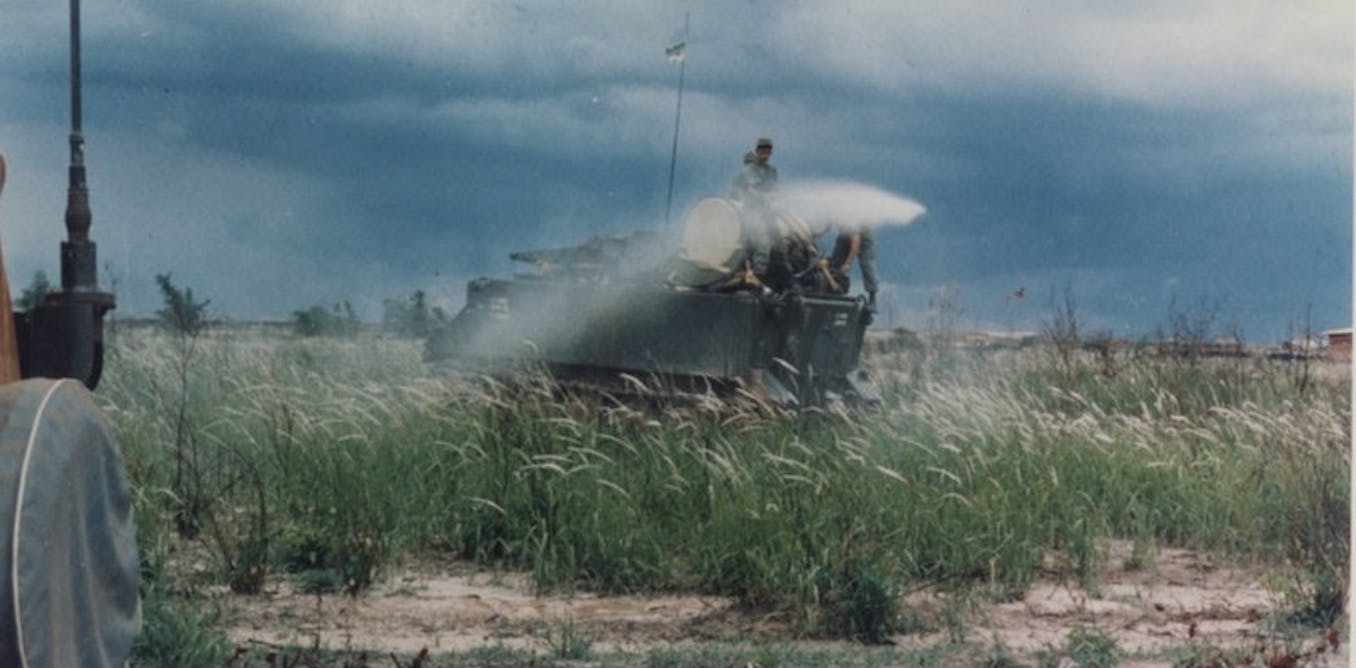In the end, the military campaign was named Operation Ranch Hand, though its original and more fitting designation was Operation Hades.
Spanning from 1961 to 1971, this Vietnam War initiative witnessed the United States discharging over 73 million liters of chemical agents across the nation, with the aim of stripping away vegetation that provided cover for Vietcong troops in “enemy territory.”
The U.S. military, utilizing various defoliants, intentionally targeted cultivated land, destroying crops and disrupting rice production and distribution by the largely communist National Liberation Front. This party was dedicated to the reunification of North and South Vietnam.
Of the 45 million liters of the sprayed toxic substance, Agent Orange, containing the harmful compound dioxin, has triggered a slow-onset disaster in Vietnam. The far-reaching economic, health and ecological impacts are still evident today.
Agent Orange Unveiled: The Prolonged Fallout of U.S. Chemical Warfare in Vietnam (Credits: The Conversation)
This stands as one of the profound legacies of the country’s 20-year war, yet it remains a truth that is yet to be squarely faced.
Even renowned documentary filmmakers Ken Burns and Lynn Novick appear to have downplayed this contentious issue in their comprehensive “Vietnam War” documentary series and subsequent discussions about the horrors of Vietnam.
More than a decade of U.S. chemical warfare in Vietnam exposed an estimated 2.1 to 4.8 million Vietnamese people to Agent Orange. Over 40 years later, the health impact on these individuals has been staggering.
The dispersion of Agent Orange over a vast area of central and south Vietnam poisoned the soil, river systems, lakes, and rice paddies, allowing toxic chemicals to enter the food chain. Today, crops are grown, and livestock graze at former U.S. bases where toxic dioxin continues to contaminate the soil.
Agent Orange’s victims weren’t limited to Vietnamese people; unaware of the dangers, U.S. soldiers sometimes used the empty 55-gallon drums for various purposes, including storing food and repurposing them as barbecue pits.
Unlike the immediate effects of another chemical weapon, napalm, which caused painful death by burns or asphyxiation, Agent Orange exposure did not manifest its impacts right away. In the first generation, high rates of various forms of cancer appeared among both U.S. soldiers and Vietnam residents.
However, the real impact became evident with the birth of children. Tens of thousands of people have suffered serious birth defects, including spina bifida, cerebral palsy, physical and intellectual disabilities, and missing or deformed limbs. The effects of the chemical are now debilitating its third and fourth generations.
Over the 10-year campaign, U.S. aircraft targeted 4.5 million acres across 30 different provinces in the area below the 17th parallel and in the Mekong Delta.
The destruction of inland hardwood forests and coastal mangrove swamps during the spraying has proven irreversible. Nearly 50 percent of the country’s mangroves, crucial for protecting shorelines from typhoons and tsunamis, were destroyed.
While efforts are being made to restore the landscape, the legacy of environmental devastation remains. The heavily polluted soil and water in former U.S. Air Force bases and other locations have yet to be recovered fully.
During Operation Ranch Hand, the U.S. and South Vietnamese governments asserted that tactical herbicides were safe for humans and the environment. U.S. propaganda about Agent Orange was so effective that it even misled American troops into thinking it was safe. This misinformation included educational programs and comic strips portraying herbicides as harmless.
It’s now evident that this was false. Allegedly, chemical manufacturers had informed the U.S. military that Agent Orange was toxic, but spraying continued nonetheless.
Agent Orange has become a contentious legal and political issue, both within Vietnam and internationally. U.S. companies, including Monsanto and Dow Chemical, argue that the governments involved in the war are solely responsible for compensating victims. A Vietnamese group’s attempt to sue companies was dismissed in 2005.
The U.S. government recently allocated over US$13 billion for expanded Agent Orange-related health services in America, but no such plan is in place in Vietnam. It seems unlikely that the U.S. will admit liability, as doing so might set an unwelcome precedent regarding the use of chemical weapons in other conflicts.
In conclusion, the suffering of Vietnamese victims of Agent Orange remains unaccounted for officially, and the opportunity to shed light on this uncomfortable truth in the Burns and Novick documentary was missed.
This article was co-authored by Hang Thai T.M., a research assistant at the Posts and Telecommunications Institute of Technology in Hanoi.
